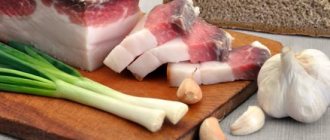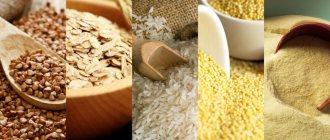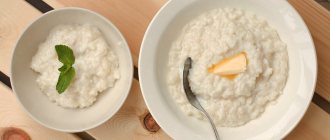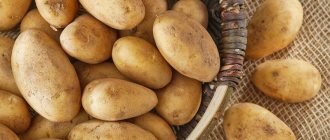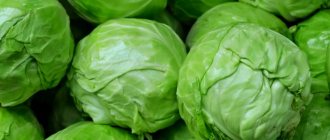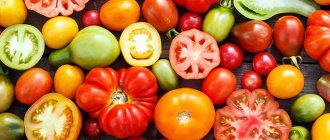The need for proper nutrition for a nursing woman
It has been repeatedly said and written that a woman needs to follow a strict diet during the period of feeding a child. After all, the baby’s health depends on proper nutrition, rich in vitamins and microelements. And the health of the nations of the planet depends on how the women of the world eat while breastfeeding.
Therefore, if fresh fruits, vegetables, and vegetable fats prevail over simple carbohydrates and excess animal fats in a mother’s diet when breastfeeding, she will have a healthy child. Otherwise, the baby will be frail and painful.
Strawberries: benefits and harms for a nursing mother. Can a nursing mother have strawberries?
The aromatic garden berry is not only tasty, but also very healthy, which is why it has found use in folk medicine. Strawberries are rich in ascorbic acid - they are ahead of citrus fruits in terms of vitamin C content.
In addition, it contains:
- vitamins of various groups;
- pectins and fiber;
- folic acid;
- trace elements (phosphorus (P), iodine (I), calcium (Ca), potassium (K), iron (Fe)).
The use of this product has a positive effect on digestion due to the high content of pectin and fiber, ascorbic acid helps increase the elasticity of blood vessels, micro- and macroelements have a beneficial effect on the functioning of organs and systems.
Strawberries are used to combat many ailments, including:
- with diarrhea;
- with obesity;
- with hypovitaminosis;
- with uterine bleeding;
- with high blood pressure.
Including berries in the diet helps improve blood formation and strengthen the immune system when fighting viral and bacterial infections.
As we can see, fresh garden berries can bring a lot of benefits to a nursing mother. If a woman is not allergic to strawberries, you can try introducing them into the menu.
Berry in the diet
Doctors point out that the risk of developing allergies in a baby is much lower if his mother regularly ate strawberries during pregnancy. In this case, the baby’s body is, to a certain extent, already adapted to the allergens contained in the product.
You can try adding berries to the menu only after the baby reaches two months of age - you need to wait until his digestive system gets a little stronger and is ready for new foods. If a child is prone to allergies, the experiment with strawberries during breastfeeding should be abandoned.
To track the baby's reaction, eat a berry (one large or two small) in the first half of the day, preferably immediately after feeding the baby. For two days, you need to carefully monitor the baby’s behavior and the condition of his skin.
An allergic reaction is indicated by lacrimation, sneezing, skin rashes (diathesis), and redness of the skin. The baby may have a stomach ache (in this case, the child behaves restlessly, pulls his legs towards his stomach, groans and cries). If such symptoms are noted, the mother will have to refuse strawberries in her diet.
If eating the berry does not affect the baby’s well-being, it is allowed to increase the amount of berries in the menu to three to five pieces per day. It is important to understand that some types of allergens have a “cumulative effect” - the reaction to them does not appear immediately, but only after reaching a certain concentration of the substance in the body.
This means that even if mother and child are not allergic to the careful introduction of the product to the menu, this product should not be abused under any circumstances, and you will have to stop eating kilograms of strawberries.
Can a nursing mother have strawberries?
During the feeding process, a young mother should carefully monitor the baby's skin. If redness appears on the cheeks, small pimples on the butt, or the stool becomes green and runny - this is already a reason to immediately cancel the questionable product.
Can a nursing mother have strawberries? This berry is a questionable product, as it can cause an allergic reaction. Young children often react to red due to intestinal problems.
They do not yet have enough of the necessary enzymes to process complex chemical compounds and substances. And these nuances are individual. In one child, after milk with strawberries, all the skin will peel off, while the other will not react.
Whether a nursing mother can eat strawberries depends on the characteristics of the baby’s body.
Can I eat strawberries while breastfeeding?
However, the question remains open: is it possible to eat strawberries while breastfeeding? The answer is simple and simple: you can, just be careful. Of course, you can’t do without “BUT” here either. It’s not for nothing that they say that everything is good in moderation. This rule holds true here as well.
Strawberries are a potentially dangerous product from the point of view of allergies, so it is, of course, possible and necessary to introduce it into the diet, but in microdoses, gradually with mandatory monitoring of the baby’s condition.
It would be foolish to deny yourself a seasonal delicacy, freshly picked from your own garden bed, exuding such a sweet and pleasant aroma. It’s doubly stupid if your mother is not allergic to strawberries, but this does not mean that you need to be particularly eager to eat a decent-sized plate and satisfy your gastronomic cravings.
The same goes for products and dishes containing strawberries, such as strawberry preserves and jams. Canned food of this kind can be eaten in moderate doses, but we must not forget about the high sugar content in such products.
One more important point must be remembered: an allergy to a particular product is not inherited and is a purely individual reaction.
You can safely eat a decent amount of strawberries, but if you are breastfeeding, your baby may react to even a couple of berries you eat.
And vice versa, if you are a strawberry allergy sufferer (let’s call it that), then it is not at all necessary that your baby will have a similar reaction to this product.
Rules for eating strawberries during breastfeeding
- There is no clear prohibition on this pleasure.
- Eat berries that you grow without chemicals. Or buy at the market from grandmothers you know in the summer. In winter, it is better to eat strawberries that are frozen while they are in season.
- Observe moderation in everything and constantly monitor your child.
- Avoid berries if your baby has allergy symptoms.
- Do not deny yourself small joys for no apparent reason.
Bon appetit and good mood!
- What berries can a nursing mother eat?
- Can a nursing mother eat watermelon?
- Nutrition during breastfeeding - about different approaches and ways to introduce new foods into the diet.
Lyudmila Sharova
to protect your baby from allergies, colic and abdominal pain. GUIDE to nutrition for nursing mothers Click and get
How to make strawberry compote for a nursing mother
Strawberry compote is prepared quite quickly, and it turns out very tasty and aromatic. During lactation, it is better to brew such a drink using the simplest recipe, including a minimum of ingredients.
Required Ingredients
- Strawberries – 1 kg;
- Water – 3 l;
- Sugar – 250 g.
Cooking process
- Sort the strawberries, wash and dry. Remove the tails.
- Pour water into a saucepan and put on fire. Boil.
- Add strawberries to the pan.
- Add sugar.
- Cook for about 10 minutes.
- Cover with a lid and leave to steep on the stove for 20 - 30 minutes.
Is it possible for a nursing mother to make strawberry compote? This drink can be harmful due to the high risk of allergies.
However, you should not refuse it for the entire period of breastfeeding. It is enough to wait 2–3 months from the moment the baby is born until the child’s body gets stronger and becomes less susceptible to allergic reactions.
In addition, you need to take care of the quality of the strawberries for the compote. You should not eat imported berries treated with nitrates and other chemicals.
The miracle of the birth of a child entails ordinary everyday worries.
Every young mother is faced with many new questions: how to wash the baby, whether to pump breasts, what to eat, when to feed, whether a nursing mother can have strawberries, and so on.
There are a lot of questions, but they are not at all difficult to understand. You need to know some information and a few rules for the mother’s nutrition, so that the baby behaves calmly and allows those around him to rest.
What strawberries can and should be eaten during breastfeeding?
An important point is the quality of such a desirable berry. Strawberries are different from strawberries, you know.
A small, inconspicuous berry, bought at the market from a pretty grandmother, may turn out to be tastier and much sweeter than hollow and watery, but beautiful, large berries from some Lenta, placed in neat baskets.
The most useful berries are those grown in season, in your own (very desirable) or private garden, collected in the forest or brought from your grandmother's dacha. It is in such a harvest that you can be sure: that same storehouse of vitamins and nutrients will definitely be present in strawberries.
The danger of fresh berries, vegetables and fruits, atypical for the current season, but sold on the shelves of hypermarkets, is that they may contain increased levels of nitrates, which, when entering the human body, can turn into toxic substances. This is a colossal burden for a baby.
Source: https://GolovaNeBoli.ru/pro-malyshej/mozhno-li-klubniku-pri-grudnom-vskarmlivanii-2.html
Vitamins and minerals for babies
The need for vitamins in the daily menu during breastfeeding has been proven repeatedly. Strawberries contain a sufficient amount of vitamins A, C, E, D, B1, B2, B5, B6, B9, H, as well as carotene. Without vitamin D, the musculoskeletal foundation will not form and rickets will develop. Vitamins A, B, C give the baby energy for digesting breast milk and vital functions. Without B9, the baby’s nervous system will not develop. Vitamins support the immune, cardiovascular, and all systems and organs of the child. A sufficient amount of minerals in this berry, necessary for the development and growth of the baby, indicates the usefulness of strawberries in the mother’s diet. The content of potassium, calcium, manganese, iodine, iron and other micro- and macroelements makes strawberries necessary and essential.
Being fed with mother's milk, the child receives everything necessary for proper development. A sufficient amount of berries and fruits in the mother’s diet ensures the baby full health in the future, harmonious physical, mental, and mental development.
Strawberries surpass citrus fruits in vitamin C content
Chemical composition and beneficial properties
Strawberries are a tasty and healthy summer berry, which is used to make fruit salad, preserves, compote, jam, as a filling for baked goods, consumed fresh or used to decorate various dishes.
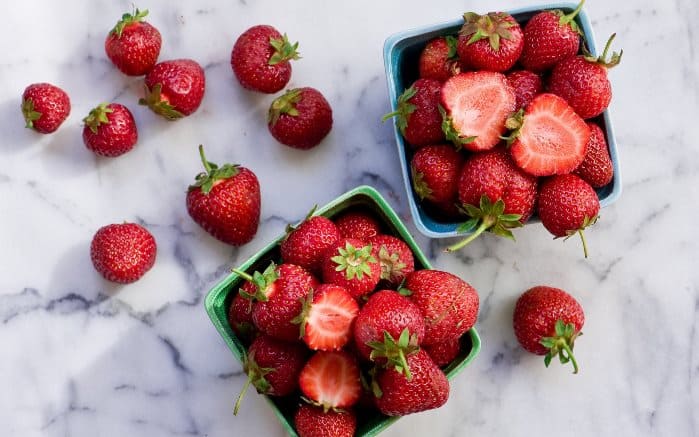
Ripe strawberries
The berries contain:
- vitamins: A, beta-carotene, group B (except B12), C, E, H, K, PP;
- minerals: potassium, calcium, silicon, magnesium, sodium, phosphorus, iron, cobalt, manganese, copper, molybdenum, chromium.
Calorie content per 100 g of product is 41 kcal.
Share of BZHU in calorie content:
- proteins - 1 g (9%);
- fats - 0 g (10%);
- carbohydrates - 8 g (82%).
Such a rich composition of vitamins, macro- and microelements has the following benefits for the body of a nursing woman:
- increasing the elasticity of blood vessels;
- strengthening the immune system;
- improving the condition of skin, hair and nails;
- increased visual acuity;
- strengthening the nervous system and emotional background;
- positive effect on all body systems;
- prevention of vitamin deficiency;
- normalization of blood pressure;
- elimination of uterine bleeding;
- combating obesity;
- elimination of diarrhea;
- improvement of hematopoiesis.
Strawberries while breastfeeding
So, we found out that in terms of vitamins and minerals, strawberries are a healthy, necessary berry for mother and child. But it is not recommended for mothers to eat strawberries uncontrollably while breastfeeding.
Restrictions when breastfeeding apply to bright red fruits and berries. These include strawberries. Because bright red fruits provoke allergies, food intolerances, gastrointestinal disorders, and other problems in children. Fruit acids contained in berries cause allergic rashes, itching and even swelling.
The problem today is that the greenhouse and greenhouse method of growing fruits and vegetables forces producers to use fertilizers. This helps to grow berries quickly, in 2-3 harvests per year. Chemicals are used for transportation and long-term storage of fruits. These fertilizers and chemicals get on the surface and inside the fruits and make them poisonous.
But even a fresh berry, just picked from a branch in your garden, sometimes causes resistance and rejection of the product by the child. After all, the tiny body has not yet learned to process anything other than mother’s milk.
A loving mother will not risk the baby’s health, because during breastfeeding, the baby’s body receives beneficial and harmful substances from the mother’s diet. Even 3-4 berries during feeding can seriously harm the health of the baby.
Berries for breastfeeding
Feeding a nursing mother is not an easy task. She faces two very important tasks - to restore her own body after pregnancy and childbirth, and also to satisfy the baby’s needs for nutritious nutrition, rich in vitamins and other nutrients.
Berries can significantly help in fulfilling both goals, but if used unwisely, they often cause allergies or eating disorders.
Can a nursing mother eat currants?
Black currant during breastfeeding is a very healthy berry that will help the mother quickly regain strength after childbirth. However, due to the high content of vitamin C, it is considered a dangerous product for infants, since ascorbic acid can cause the development of an allergy to currants in a child.
During breastfeeding, currants should be introduced into the diet with extreme caution and in compliance with all rules. Otherwise, you can seriously harm the baby’s health and get a lot of problems instead of the desired benefit.
But a nursing mother should not completely give up currants. The benefits of currants are undeniable, even if they are allergenic. And summer is the time for berries and vegetables, which means they must be included in the diet. This is the only way to get the maximum charge of vitamins and nutrients of the most natural origin.
By the way, there are three types of berries - black, white and red currants. All of them are equally useful and differ, in addition to color, in the nuances of their micronutrient content. For example, red and white currants have slightly less ascorbic acid, but more iodine, a lot of folic acid and biotin. And red and black have more iron than white, so they are more useful for problems with blood clotting.
Are strawberries allowed while breastfeeding?
But summer berries are not only currants. There are many others that just beg to be added to the table, for example, strawberries. You should also be very careful with it, since strawberries can easily cause allergies in your baby, like other brightly colored foods.
Therefore, most experts recommend completely abandoning them at first, and when the baby grows up a little, include strawberries in the menu in very small quantities. You should also be careful when eating strawberry jam, because in addition to the allergenic berry, it contains quite a lot of sugar.
Strawberries under guard
Strawberries, like strawberries, are considered high-risk berries when breastfeeding. It can be eaten by a nursing mother in very small quantities and preferably after the baby has grown a little. In this case, it is important to exercise extreme caution, choose only those berries of which the mother is completely confident, and also constantly monitor the child’s condition.
Gooseberries during breastfeeding
There is no need to doubt whether gooseberries are good for breastfeeding - this is one of the healthiest berries, which, in addition, almost never causes allergies. It is able to remove inflammation, strengthen the immune system and improve blood circulation.
Gooseberries will also be useful for a nursing mother as a prevention of atherosclerosis, hypertension, and excess cholesterol. And also - gooseberries are strong antioxidants, so they will also help preserve beauty.
What about other berries?
It is, of course, impossible to describe all the berries, but the rules for their use are, in general, quite similar. You can try, but carefully, and at the same time keep an eye on the child’s reaction: are there any problems with the tummy, has the skin become drier, is it itching, is a rash appearing. Particular attention should be paid to potentially hazardous products:
- citrus;
- sea buckthorn and its oil;
- red berries;
- exotic fruits.
But, for example, honeysuckle is very useful for a nursing mother. It is rich in iron, iodine and vitamins, so the baby grows strong and healthy on this milk.
How long does it take for a reaction to the product to appear?
To track how the baby will react to foods on the mother's menu, find out how long it takes for the reaction to the product to appear. Nutrients, beneficial and harmful substances, digested from the mother's food products, enter breast milk for different times.
Thus, vitamins, riboflavins, thiamines, acids and other substances necessary for the child’s body quickly become components of breast milk. Vitamin reserves need to be replenished daily. While the feeding period is ongoing, mommy must eat berries, fruits, and vegetables every day. This is equally necessary for mother and child.
Allergens from berries arrive within 1-3 hours and continue to accumulate in mother's milk. Red berries and fruits, which contain histamines, often cause rashes, itching, and other allergic disorders in babies. Strawberries are also allergenic foods. The child’s reaction to it will appear within 4-6 hours.
Recipe
Breastfeeding women are advised to eat only jam that has been heat-treated for at least 20 minutes. This will definitely kill all the bacteria that are dangerous to the health of mother and baby.
When boiling the berries, they nevertheless retain a sufficient amount of vitamins and other useful elements.
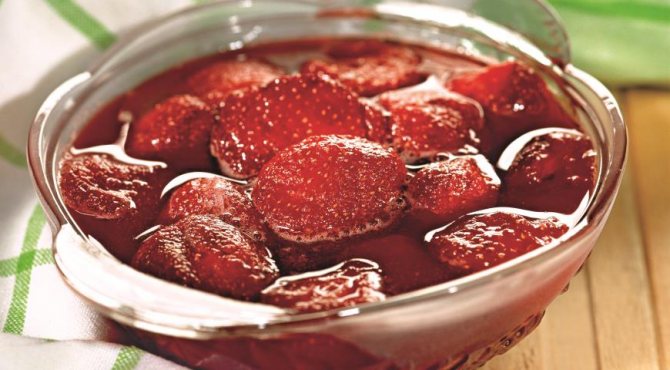
Homemade strawberry jam for a nursing mother.
Compound:
- strawberries - 1 kg;
- sugar - 1.2 kg.
Preparation:
- Sort the berries and rinse.
- Place the berries in a cooking pot and add sugar.
- Leave in a cool place for 8–10 hours (the strawberries will “give juice”).
- Place the pan over low heat and bring to a boil, skimming off the foam.
- Cook the berries for 20–30 minutes.
- The jam is ready. Store the jam in a cool, dark place.
Or use the video recipe:
Rules for introducing strawberries into the diet
So, can a nursing mother have strawberries? Yes, but on the condition that she is careful. If a nursing mother tries 1-2 berries in the morning and carefully watches the baby throughout the day, she will gradually accustom the baby to these healthy berries.
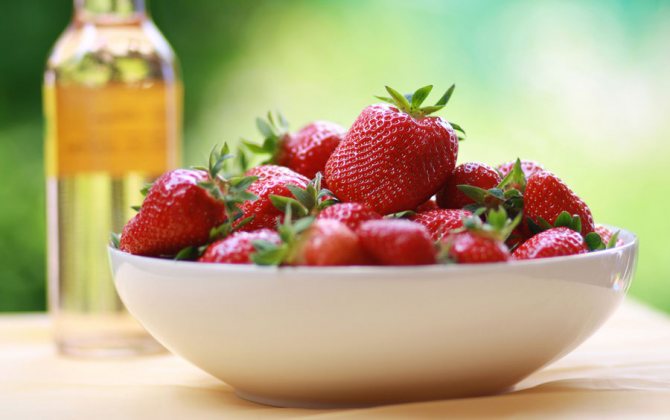
The mother should introduce strawberries into her diet no earlier than the baby is two months old. It’s better to start with a few berries
Having eaten 1-2 strawberries in the morning an hour before feeding, by the evening you will find out how the child perceived the experiment. If he is alert and active during the day, if the stool is normal and the skin is clean, continue to accustom your baby to berries. First 1-2, then add 2-3. After the baby gets used to it, eat 1-1.5 glasses a day. When the baby grows up, he will eat these red berries with appetite.
You cannot refuse berries, fruits, and vegetables during the breastfeeding period. Especially during the ripening season in your area. At this time, the fruits contain substances beneficial to the body that are required by mother and child up to one year old. The main thing is to remember to rinse the berries thoroughly so as not to harm the baby instead of benefiting them.
Reviews
In the second month after giving birth, I ate strawberries under guards. The next day the child broke out, the redness went away only after 3 days. As the pediatrician explained to me, it was an allergic reaction in the baby to the introduction of a new product into my diet. The next time I tried strawberries only after lactation was complete.
At 3 months after giving birth, I immediately ate 0.5 kg of strawberries. This did not affect the child in any way.
When the baby was 5 months old, I tried strawberries for the first time during lactation. Before this, I followed a special diet, since my child is prone to allergies. At first I ate 1 berry once every three days, then I increased the quantity to 3 pieces. The child did not develop any rashes or upset bowel movements.
Strawberries are a juicy berry that enriches the body of a nursing woman with all the necessary vitamins and minerals. To maximize the benefits of consuming it, you need to eat the berry in small quantities, and at the first signs of an allergic reaction or deterioration in health, immediately exclude the product from your diet.
How to eat strawberries during lactation
We start eating this juicy, fragrant Fragaria moschata from the end of May, in June, and until the beginning of July, the strawberry delights us with its delicate taste and aroma. We have already found out how useful this juicy berry is for a woman during breastfeeding and why a newborn needs it during the months of breastfeeding.
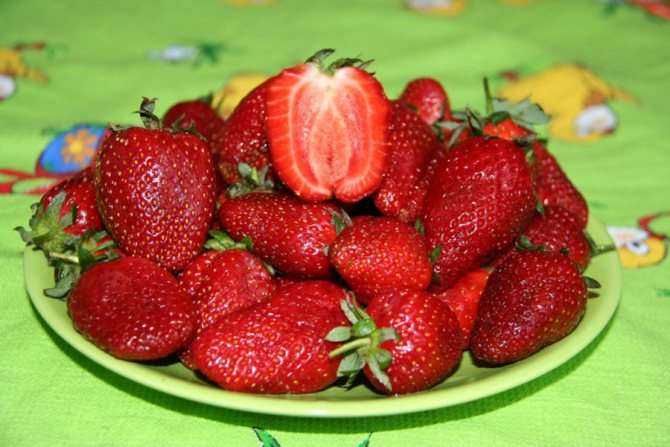
It is ideal to eat strawberries grown by yourself. But if you don’t have a summer house, then you should buy berries only during their ripening season and it is advisable to use a nitratotester before eating
Now let's talk about how to enjoy this juicy berry throughout the year. When we are a little full of the berries of the first harvest, we want variety.
We recommend reading: Is it possible to eat gooseberries while breastfeeding?
- Fresh berry compote is useful for breastfeeding women. It not only quenches thirst, but also enhances lactation. The compote is prepared within 5-10 minutes. Pour cold water over thoroughly washed berries without soil and debris, bring to a boil over medium heat, add sugar, boil for 2-3 minutes, strain, serve without berries. And babies will love this red compote. For 1 glass of berries - 4-5 tablespoons of sugar, 3-4 glasses of water.
- For the winter, housewives prepare jams and preserves from strawberries. To make berry jam, use one and a half times more sugar than sugar: for 1.5 kg of berries - 1 kg of sugar. Cover the strawberries with half the sugar and leave for 5-6 hours. After the juice appears, bring to a boil without stirring and skimming off the foam. Add a quarter of the remaining sugar, boil for 10 minutes, leave for 5-7 hours to settle. Thus, for 5-10 minutes, adding the remaining sugar, cook 3-5 times until tender. Perhaps this is too heavy a meal for a baby, but for mom this food is healthy.
- If you have time to freeze berries in the summer, it means you will provide your family with vitamins in the winter. In winter, it is better not to buy fresh imported or greenhouse-grown strawberries. And when frozen, the nutrients and even the aroma are preserved. You can simply freeze the berries (separately), or you can make dumplings with them; this dish is not contraindicated for nursing mothers.
- Pour half-thawed berries with gelatin solution and pour into bowls. You will get healthy strawberry jelly. Rave reviews from moms about this dessert exceed all expectations.
Rules for choosing strawberries
To maximize the benefits of eating strawberries, you should only consume a high-quality product. Read below about how to choose it.
It is best to buy strawberries in season, if possible from summer residents or at the market. The one sold in stores is usually treated with various chemicals for rapid ripening and long-term storage.
A high-quality berry has a characteristic smell and red color; it has no dents, scratches, cracks or other signs of damage.
Strawberries should be purchased when they are in season. Some of its varieties ripen by June, while others ripen by July.
The berries can be frozen to be used in winter for making compote, desserts or filling for dumplings, pies and pies. But it is worth remembering that the most vitamins are contained in fresh strawberries.

